Mental Health Reflection: Townsville Hospital Ward 10B
VerifiedAdded on 2022/08/25
|9
|2671
|216
Journal and Reflective Writing
AI Summary
This assignment is a reflective analysis of a student's experience and observations regarding mental health care, specifically focusing on malpractice and negligence within Townsville Hospital's Ward 10B, a psychiatric department. The student utilizes Gibb's reflective model to evaluate the delivery of inappropriate care, including excessive medication dosages, unauthorized administration of drugs by nurses, and the use of physical torture. The assignment highlights the lack of ethical standards, poor governance, and the impact of such practices on patient well-being, including cases of suicide. The reflection covers the student's feelings, evaluation of the experience, and analysis of the situation, emphasizing the importance of reporting, leadership, and decision-making in mental healthcare. The assignment concludes with an action plan for improving the student's skills, focusing on patient relationships, medication knowledge, effective care delivery, team collaboration, and understanding of nursing standards and ethics to mitigate ethical dilemmas and improve patient care. The student aims to enhance their skills in patient care and create a more ethical and effective environment for mental health treatment.
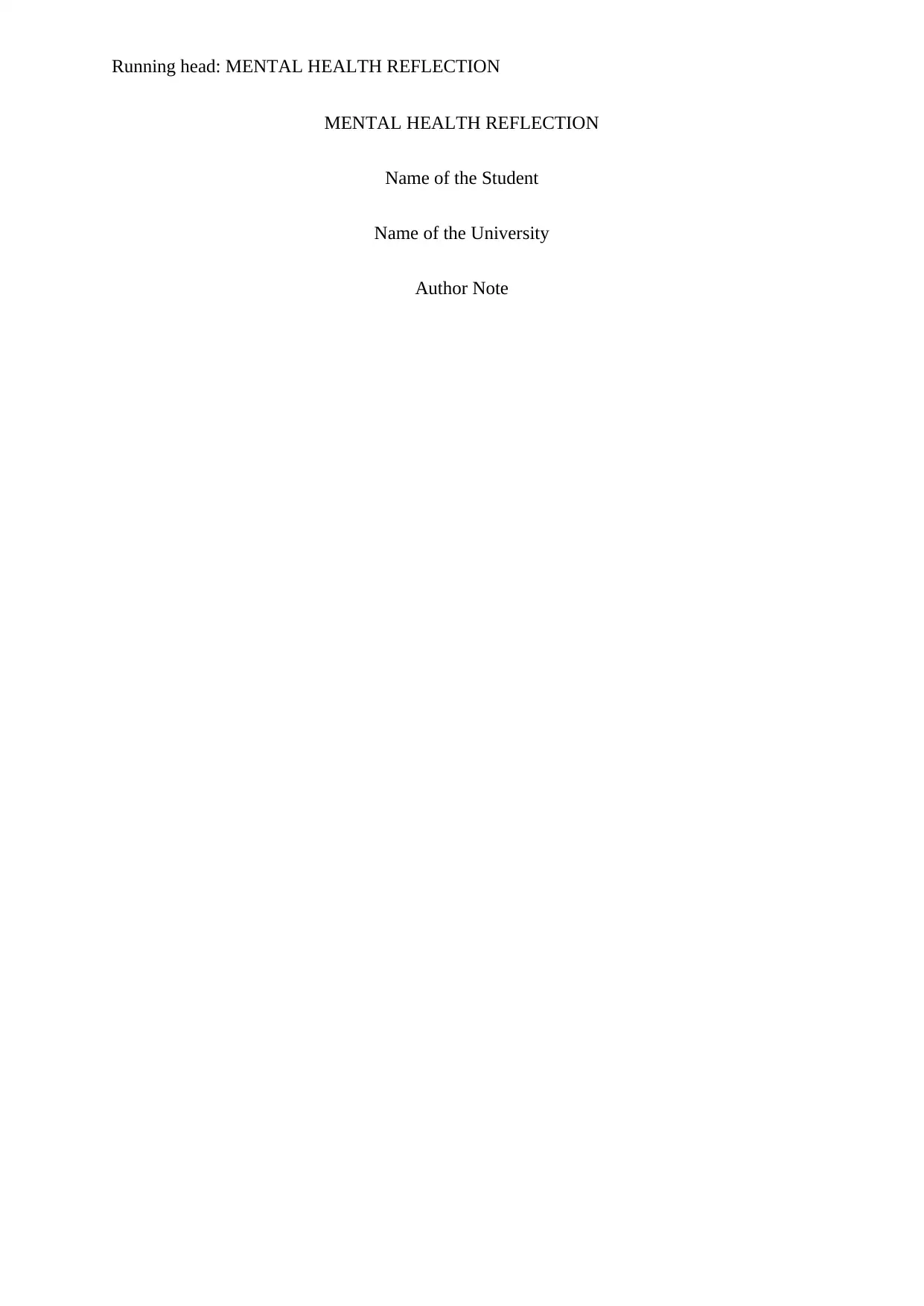
Running head: MENTAL HEALTH REFLECTION
MENTAL HEALTH REFLECTION
Name of the Student
Name of the University
Author Note
MENTAL HEALTH REFLECTION
Name of the Student
Name of the University
Author Note
Paraphrase This Document
Need a fresh take? Get an instant paraphrase of this document with our AI Paraphraser
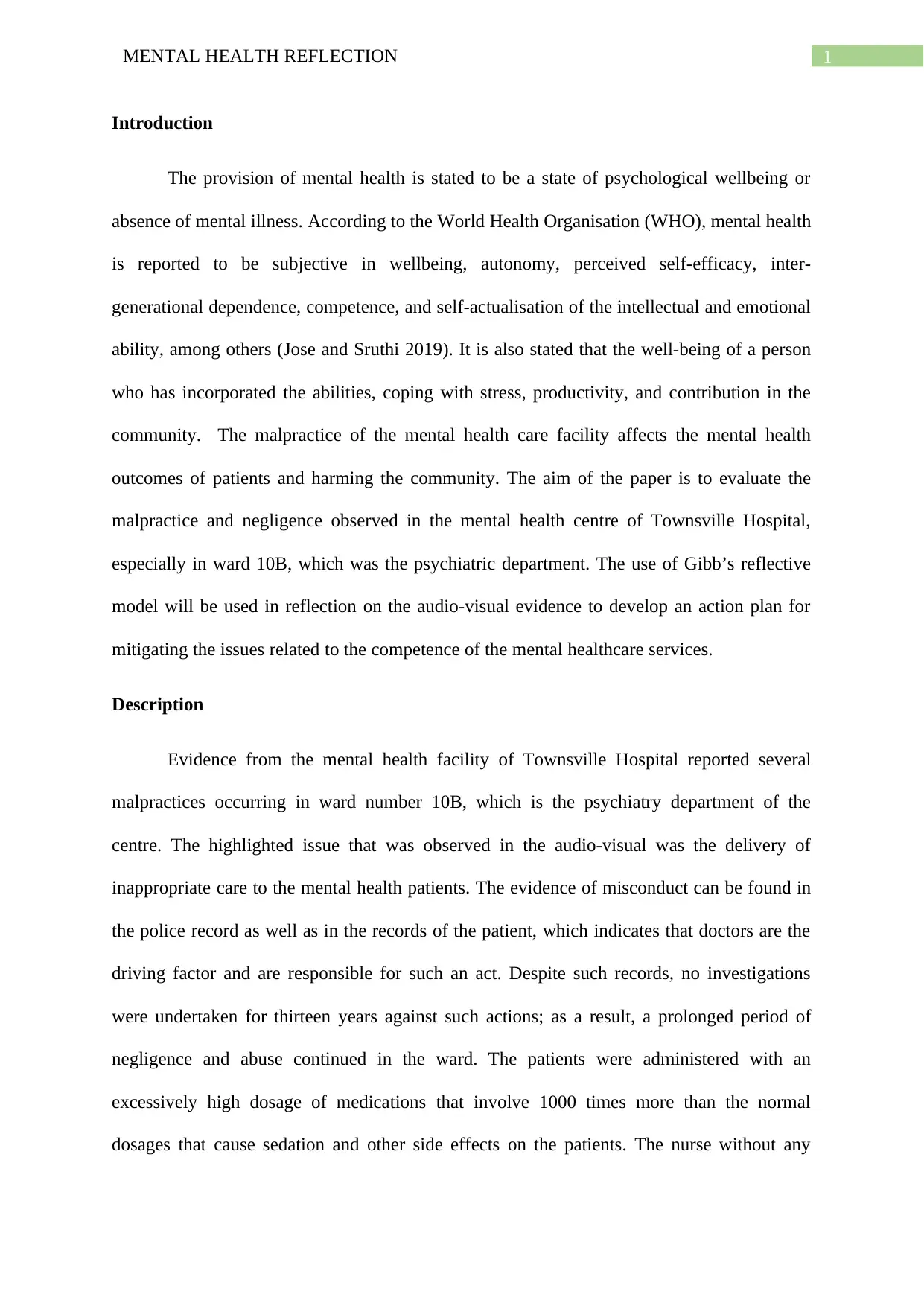
1MENTAL HEALTH REFLECTION
Introduction
The provision of mental health is stated to be a state of psychological wellbeing or
absence of mental illness. According to the World Health Organisation (WHO), mental health
is reported to be subjective in wellbeing, autonomy, perceived self-efficacy, inter-
generational dependence, competence, and self-actualisation of the intellectual and emotional
ability, among others (Jose and Sruthi 2019). It is also stated that the well-being of a person
who has incorporated the abilities, coping with stress, productivity, and contribution in the
community. The malpractice of the mental health care facility affects the mental health
outcomes of patients and harming the community. The aim of the paper is to evaluate the
malpractice and negligence observed in the mental health centre of Townsville Hospital,
especially in ward 10B, which was the psychiatric department. The use of Gibb’s reflective
model will be used in reflection on the audio-visual evidence to develop an action plan for
mitigating the issues related to the competence of the mental healthcare services.
Description
Evidence from the mental health facility of Townsville Hospital reported several
malpractices occurring in ward number 10B, which is the psychiatry department of the
centre. The highlighted issue that was observed in the audio-visual was the delivery of
inappropriate care to the mental health patients. The evidence of misconduct can be found in
the police record as well as in the records of the patient, which indicates that doctors are the
driving factor and are responsible for such an act. Despite such records, no investigations
were undertaken for thirteen years against such actions; as a result, a prolonged period of
negligence and abuse continued in the ward. The patients were administered with an
excessively high dosage of medications that involve 1000 times more than the normal
dosages that cause sedation and other side effects on the patients. The nurse without any
Introduction
The provision of mental health is stated to be a state of psychological wellbeing or
absence of mental illness. According to the World Health Organisation (WHO), mental health
is reported to be subjective in wellbeing, autonomy, perceived self-efficacy, inter-
generational dependence, competence, and self-actualisation of the intellectual and emotional
ability, among others (Jose and Sruthi 2019). It is also stated that the well-being of a person
who has incorporated the abilities, coping with stress, productivity, and contribution in the
community. The malpractice of the mental health care facility affects the mental health
outcomes of patients and harming the community. The aim of the paper is to evaluate the
malpractice and negligence observed in the mental health centre of Townsville Hospital,
especially in ward 10B, which was the psychiatric department. The use of Gibb’s reflective
model will be used in reflection on the audio-visual evidence to develop an action plan for
mitigating the issues related to the competence of the mental healthcare services.
Description
Evidence from the mental health facility of Townsville Hospital reported several
malpractices occurring in ward number 10B, which is the psychiatry department of the
centre. The highlighted issue that was observed in the audio-visual was the delivery of
inappropriate care to the mental health patients. The evidence of misconduct can be found in
the police record as well as in the records of the patient, which indicates that doctors are the
driving factor and are responsible for such an act. Despite such records, no investigations
were undertaken for thirteen years against such actions; as a result, a prolonged period of
negligence and abuse continued in the ward. The patients were administered with an
excessively high dosage of medications that involve 1000 times more than the normal
dosages that cause sedation and other side effects on the patients. The nurse without any
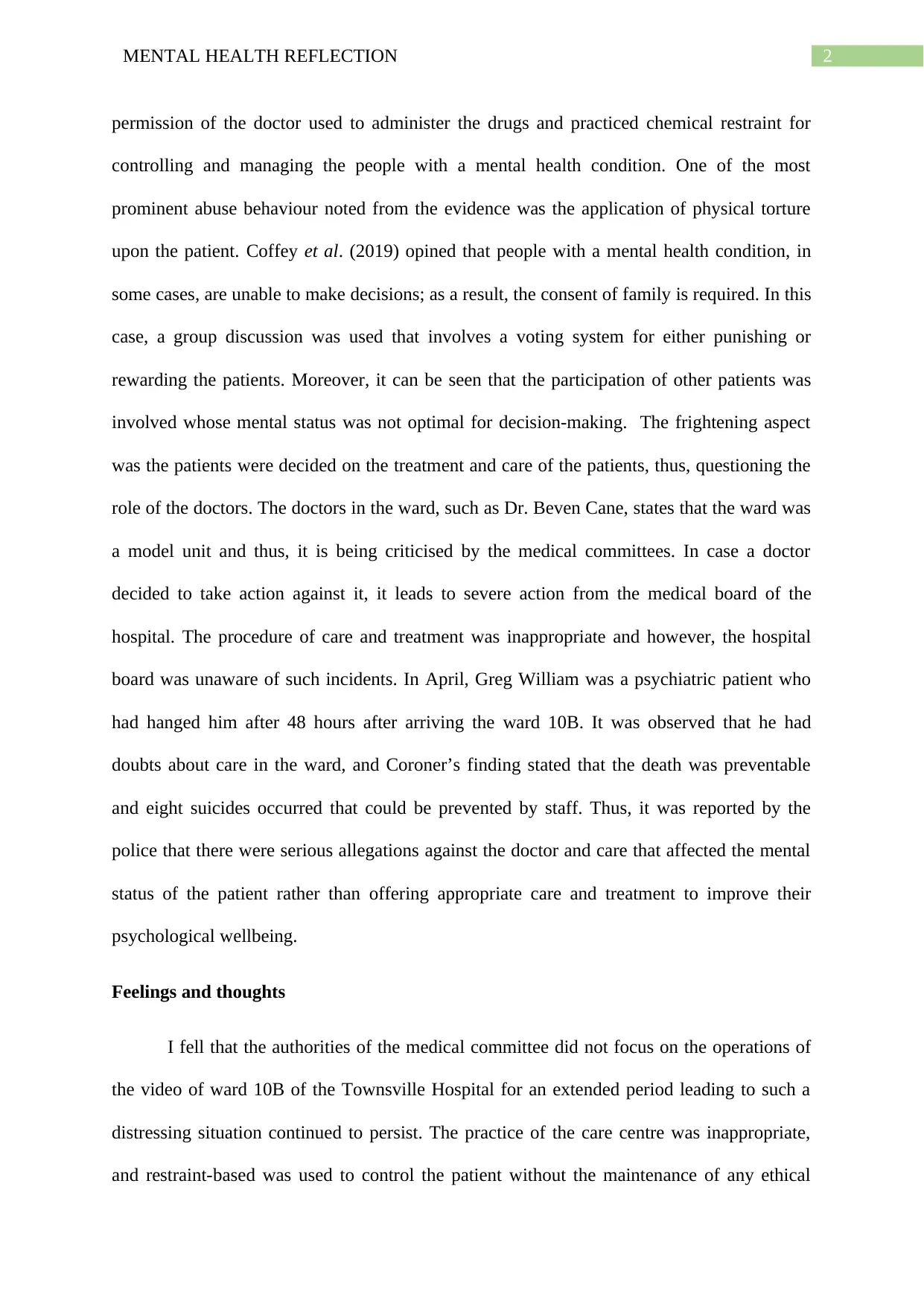
2MENTAL HEALTH REFLECTION
permission of the doctor used to administer the drugs and practiced chemical restraint for
controlling and managing the people with a mental health condition. One of the most
prominent abuse behaviour noted from the evidence was the application of physical torture
upon the patient. Coffey et al. (2019) opined that people with a mental health condition, in
some cases, are unable to make decisions; as a result, the consent of family is required. In this
case, a group discussion was used that involves a voting system for either punishing or
rewarding the patients. Moreover, it can be seen that the participation of other patients was
involved whose mental status was not optimal for decision-making. The frightening aspect
was the patients were decided on the treatment and care of the patients, thus, questioning the
role of the doctors. The doctors in the ward, such as Dr. Beven Cane, states that the ward was
a model unit and thus, it is being criticised by the medical committees. In case a doctor
decided to take action against it, it leads to severe action from the medical board of the
hospital. The procedure of care and treatment was inappropriate and however, the hospital
board was unaware of such incidents. In April, Greg William was a psychiatric patient who
had hanged him after 48 hours after arriving the ward 10B. It was observed that he had
doubts about care in the ward, and Coroner’s finding stated that the death was preventable
and eight suicides occurred that could be prevented by staff. Thus, it was reported by the
police that there were serious allegations against the doctor and care that affected the mental
status of the patient rather than offering appropriate care and treatment to improve their
psychological wellbeing.
Feelings and thoughts
I fell that the authorities of the medical committee did not focus on the operations of
the video of ward 10B of the Townsville Hospital for an extended period leading to such a
distressing situation continued to persist. The practice of the care centre was inappropriate,
and restraint-based was used to control the patient without the maintenance of any ethical
permission of the doctor used to administer the drugs and practiced chemical restraint for
controlling and managing the people with a mental health condition. One of the most
prominent abuse behaviour noted from the evidence was the application of physical torture
upon the patient. Coffey et al. (2019) opined that people with a mental health condition, in
some cases, are unable to make decisions; as a result, the consent of family is required. In this
case, a group discussion was used that involves a voting system for either punishing or
rewarding the patients. Moreover, it can be seen that the participation of other patients was
involved whose mental status was not optimal for decision-making. The frightening aspect
was the patients were decided on the treatment and care of the patients, thus, questioning the
role of the doctors. The doctors in the ward, such as Dr. Beven Cane, states that the ward was
a model unit and thus, it is being criticised by the medical committees. In case a doctor
decided to take action against it, it leads to severe action from the medical board of the
hospital. The procedure of care and treatment was inappropriate and however, the hospital
board was unaware of such incidents. In April, Greg William was a psychiatric patient who
had hanged him after 48 hours after arriving the ward 10B. It was observed that he had
doubts about care in the ward, and Coroner’s finding stated that the death was preventable
and eight suicides occurred that could be prevented by staff. Thus, it was reported by the
police that there were serious allegations against the doctor and care that affected the mental
status of the patient rather than offering appropriate care and treatment to improve their
psychological wellbeing.
Feelings and thoughts
I fell that the authorities of the medical committee did not focus on the operations of
the video of ward 10B of the Townsville Hospital for an extended period leading to such a
distressing situation continued to persist. The practice of the care centre was inappropriate,
and restraint-based was used to control the patient without the maintenance of any ethical
⊘ This is a preview!⊘
Do you want full access?
Subscribe today to unlock all pages.

Trusted by 1+ million students worldwide
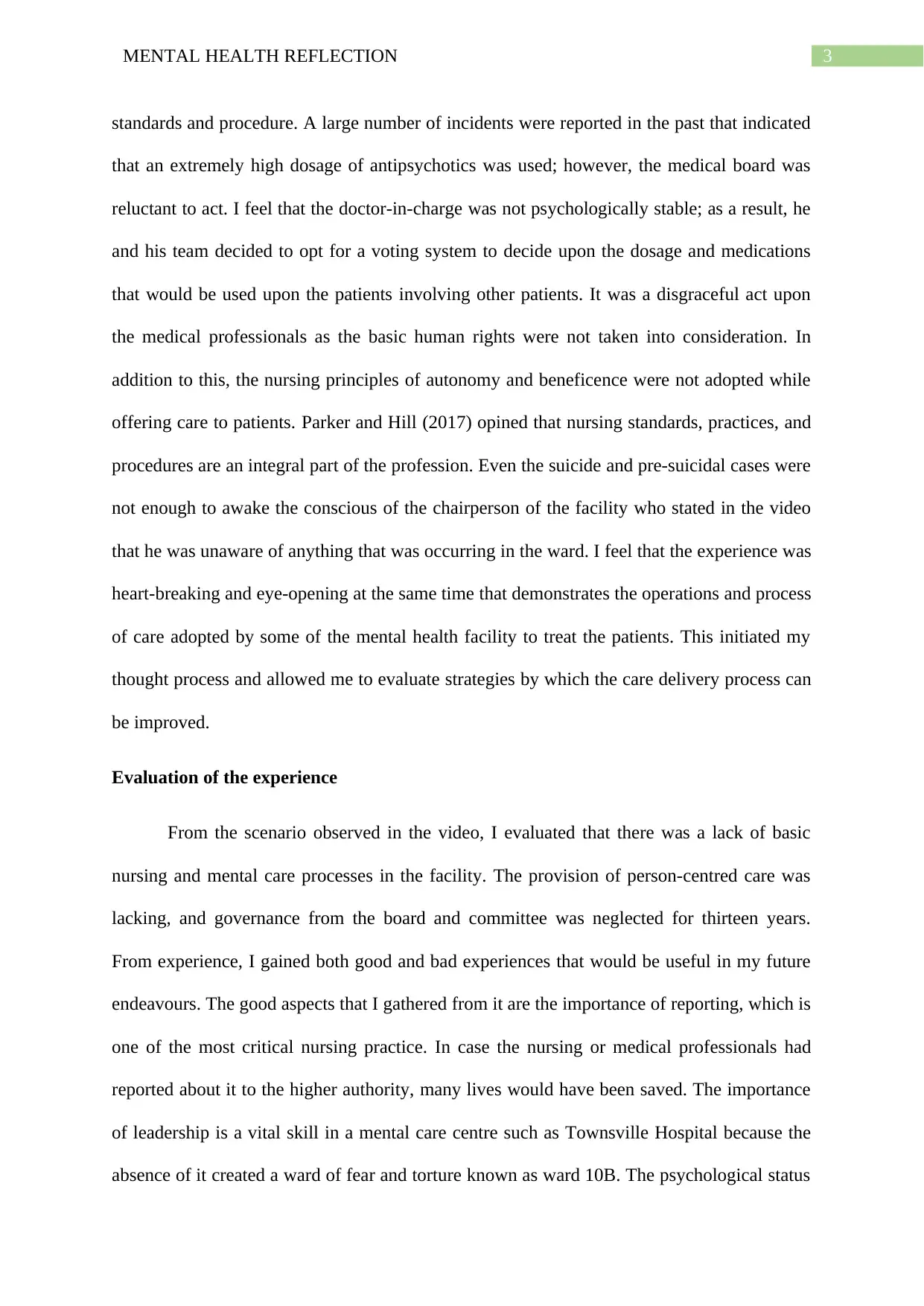
3MENTAL HEALTH REFLECTION
standards and procedure. A large number of incidents were reported in the past that indicated
that an extremely high dosage of antipsychotics was used; however, the medical board was
reluctant to act. I feel that the doctor-in-charge was not psychologically stable; as a result, he
and his team decided to opt for a voting system to decide upon the dosage and medications
that would be used upon the patients involving other patients. It was a disgraceful act upon
the medical professionals as the basic human rights were not taken into consideration. In
addition to this, the nursing principles of autonomy and beneficence were not adopted while
offering care to patients. Parker and Hill (2017) opined that nursing standards, practices, and
procedures are an integral part of the profession. Even the suicide and pre-suicidal cases were
not enough to awake the conscious of the chairperson of the facility who stated in the video
that he was unaware of anything that was occurring in the ward. I feel that the experience was
heart-breaking and eye-opening at the same time that demonstrates the operations and process
of care adopted by some of the mental health facility to treat the patients. This initiated my
thought process and allowed me to evaluate strategies by which the care delivery process can
be improved.
Evaluation of the experience
From the scenario observed in the video, I evaluated that there was a lack of basic
nursing and mental care processes in the facility. The provision of person-centred care was
lacking, and governance from the board and committee was neglected for thirteen years.
From experience, I gained both good and bad experiences that would be useful in my future
endeavours. The good aspects that I gathered from it are the importance of reporting, which is
one of the most critical nursing practice. In case the nursing or medical professionals had
reported about it to the higher authority, many lives would have been saved. The importance
of leadership is a vital skill in a mental care centre such as Townsville Hospital because the
absence of it created a ward of fear and torture known as ward 10B. The psychological status
standards and procedure. A large number of incidents were reported in the past that indicated
that an extremely high dosage of antipsychotics was used; however, the medical board was
reluctant to act. I feel that the doctor-in-charge was not psychologically stable; as a result, he
and his team decided to opt for a voting system to decide upon the dosage and medications
that would be used upon the patients involving other patients. It was a disgraceful act upon
the medical professionals as the basic human rights were not taken into consideration. In
addition to this, the nursing principles of autonomy and beneficence were not adopted while
offering care to patients. Parker and Hill (2017) opined that nursing standards, practices, and
procedures are an integral part of the profession. Even the suicide and pre-suicidal cases were
not enough to awake the conscious of the chairperson of the facility who stated in the video
that he was unaware of anything that was occurring in the ward. I feel that the experience was
heart-breaking and eye-opening at the same time that demonstrates the operations and process
of care adopted by some of the mental health facility to treat the patients. This initiated my
thought process and allowed me to evaluate strategies by which the care delivery process can
be improved.
Evaluation of the experience
From the scenario observed in the video, I evaluated that there was a lack of basic
nursing and mental care processes in the facility. The provision of person-centred care was
lacking, and governance from the board and committee was neglected for thirteen years.
From experience, I gained both good and bad experiences that would be useful in my future
endeavours. The good aspects that I gathered from it are the importance of reporting, which is
one of the most critical nursing practice. In case the nursing or medical professionals had
reported about it to the higher authority, many lives would have been saved. The importance
of leadership is a vital skill in a mental care centre such as Townsville Hospital because the
absence of it created a ward of fear and torture known as ward 10B. The psychological status
Paraphrase This Document
Need a fresh take? Get an instant paraphrase of this document with our AI Paraphraser
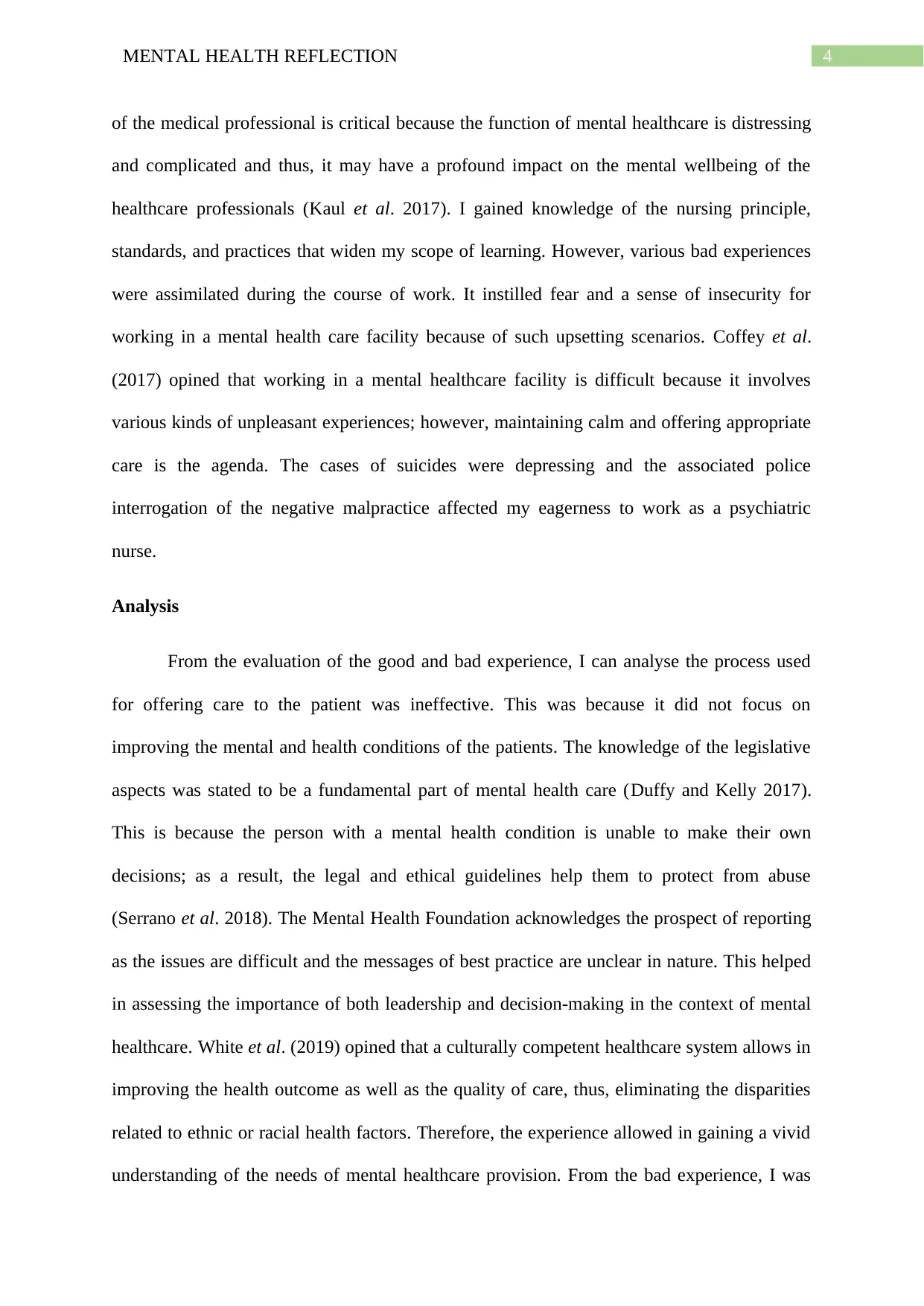
4MENTAL HEALTH REFLECTION
of the medical professional is critical because the function of mental healthcare is distressing
and complicated and thus, it may have a profound impact on the mental wellbeing of the
healthcare professionals (Kaul et al. 2017). I gained knowledge of the nursing principle,
standards, and practices that widen my scope of learning. However, various bad experiences
were assimilated during the course of work. It instilled fear and a sense of insecurity for
working in a mental health care facility because of such upsetting scenarios. Coffey et al.
(2017) opined that working in a mental healthcare facility is difficult because it involves
various kinds of unpleasant experiences; however, maintaining calm and offering appropriate
care is the agenda. The cases of suicides were depressing and the associated police
interrogation of the negative malpractice affected my eagerness to work as a psychiatric
nurse.
Analysis
From the evaluation of the good and bad experience, I can analyse the process used
for offering care to the patient was ineffective. This was because it did not focus on
improving the mental and health conditions of the patients. The knowledge of the legislative
aspects was stated to be a fundamental part of mental health care (Duffy and Kelly 2017).
This is because the person with a mental health condition is unable to make their own
decisions; as a result, the legal and ethical guidelines help them to protect from abuse
(Serrano et al. 2018). The Mental Health Foundation acknowledges the prospect of reporting
as the issues are difficult and the messages of best practice are unclear in nature. This helped
in assessing the importance of both leadership and decision-making in the context of mental
healthcare. White et al. (2019) opined that a culturally competent healthcare system allows in
improving the health outcome as well as the quality of care, thus, eliminating the disparities
related to ethnic or racial health factors. Therefore, the experience allowed in gaining a vivid
understanding of the needs of mental healthcare provision. From the bad experience, I was
of the medical professional is critical because the function of mental healthcare is distressing
and complicated and thus, it may have a profound impact on the mental wellbeing of the
healthcare professionals (Kaul et al. 2017). I gained knowledge of the nursing principle,
standards, and practices that widen my scope of learning. However, various bad experiences
were assimilated during the course of work. It instilled fear and a sense of insecurity for
working in a mental health care facility because of such upsetting scenarios. Coffey et al.
(2017) opined that working in a mental healthcare facility is difficult because it involves
various kinds of unpleasant experiences; however, maintaining calm and offering appropriate
care is the agenda. The cases of suicides were depressing and the associated police
interrogation of the negative malpractice affected my eagerness to work as a psychiatric
nurse.
Analysis
From the evaluation of the good and bad experience, I can analyse the process used
for offering care to the patient was ineffective. This was because it did not focus on
improving the mental and health conditions of the patients. The knowledge of the legislative
aspects was stated to be a fundamental part of mental health care (Duffy and Kelly 2017).
This is because the person with a mental health condition is unable to make their own
decisions; as a result, the legal and ethical guidelines help them to protect from abuse
(Serrano et al. 2018). The Mental Health Foundation acknowledges the prospect of reporting
as the issues are difficult and the messages of best practice are unclear in nature. This helped
in assessing the importance of both leadership and decision-making in the context of mental
healthcare. White et al. (2019) opined that a culturally competent healthcare system allows in
improving the health outcome as well as the quality of care, thus, eliminating the disparities
related to ethnic or racial health factors. Therefore, the experience allowed in gaining a vivid
understanding of the needs of mental healthcare provision. From the bad experience, I was
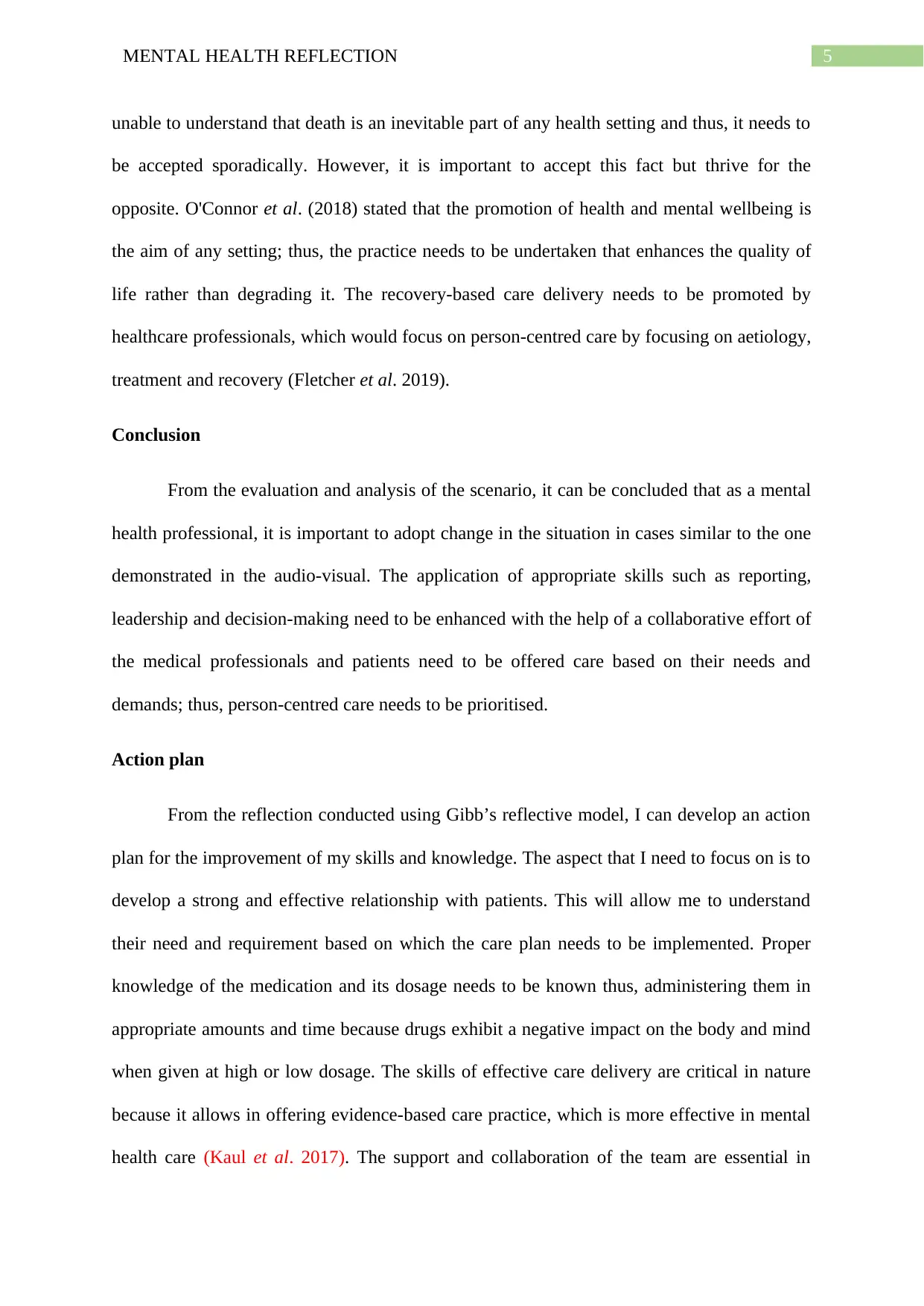
5MENTAL HEALTH REFLECTION
unable to understand that death is an inevitable part of any health setting and thus, it needs to
be accepted sporadically. However, it is important to accept this fact but thrive for the
opposite. O'Connor et al. (2018) stated that the promotion of health and mental wellbeing is
the aim of any setting; thus, the practice needs to be undertaken that enhances the quality of
life rather than degrading it. The recovery-based care delivery needs to be promoted by
healthcare professionals, which would focus on person-centred care by focusing on aetiology,
treatment and recovery (Fletcher et al. 2019).
Conclusion
From the evaluation and analysis of the scenario, it can be concluded that as a mental
health professional, it is important to adopt change in the situation in cases similar to the one
demonstrated in the audio-visual. The application of appropriate skills such as reporting,
leadership and decision-making need to be enhanced with the help of a collaborative effort of
the medical professionals and patients need to be offered care based on their needs and
demands; thus, person-centred care needs to be prioritised.
Action plan
From the reflection conducted using Gibb’s reflective model, I can develop an action
plan for the improvement of my skills and knowledge. The aspect that I need to focus on is to
develop a strong and effective relationship with patients. This will allow me to understand
their need and requirement based on which the care plan needs to be implemented. Proper
knowledge of the medication and its dosage needs to be known thus, administering them in
appropriate amounts and time because drugs exhibit a negative impact on the body and mind
when given at high or low dosage. The skills of effective care delivery are critical in nature
because it allows in offering evidence-based care practice, which is more effective in mental
health care (Kaul et al. 2017). The support and collaboration of the team are essential in
unable to understand that death is an inevitable part of any health setting and thus, it needs to
be accepted sporadically. However, it is important to accept this fact but thrive for the
opposite. O'Connor et al. (2018) stated that the promotion of health and mental wellbeing is
the aim of any setting; thus, the practice needs to be undertaken that enhances the quality of
life rather than degrading it. The recovery-based care delivery needs to be promoted by
healthcare professionals, which would focus on person-centred care by focusing on aetiology,
treatment and recovery (Fletcher et al. 2019).
Conclusion
From the evaluation and analysis of the scenario, it can be concluded that as a mental
health professional, it is important to adopt change in the situation in cases similar to the one
demonstrated in the audio-visual. The application of appropriate skills such as reporting,
leadership and decision-making need to be enhanced with the help of a collaborative effort of
the medical professionals and patients need to be offered care based on their needs and
demands; thus, person-centred care needs to be prioritised.
Action plan
From the reflection conducted using Gibb’s reflective model, I can develop an action
plan for the improvement of my skills and knowledge. The aspect that I need to focus on is to
develop a strong and effective relationship with patients. This will allow me to understand
their need and requirement based on which the care plan needs to be implemented. Proper
knowledge of the medication and its dosage needs to be known thus, administering them in
appropriate amounts and time because drugs exhibit a negative impact on the body and mind
when given at high or low dosage. The skills of effective care delivery are critical in nature
because it allows in offering evidence-based care practice, which is more effective in mental
health care (Kaul et al. 2017). The support and collaboration of the team are essential in
⊘ This is a preview!⊘
Do you want full access?
Subscribe today to unlock all pages.

Trusted by 1+ million students worldwide
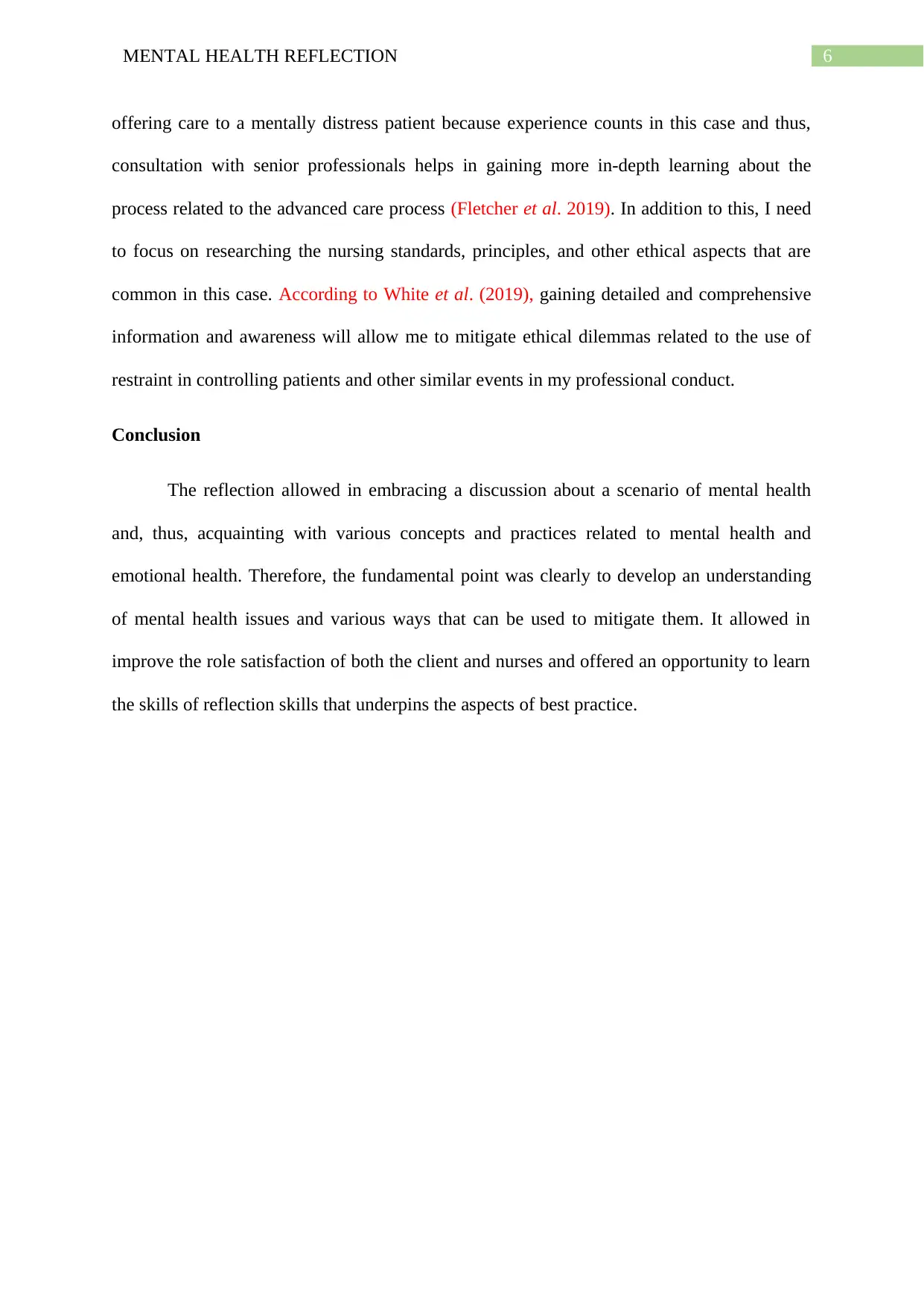
6MENTAL HEALTH REFLECTION
offering care to a mentally distress patient because experience counts in this case and thus,
consultation with senior professionals helps in gaining more in-depth learning about the
process related to the advanced care process (Fletcher et al. 2019). In addition to this, I need
to focus on researching the nursing standards, principles, and other ethical aspects that are
common in this case. According to White et al. (2019), gaining detailed and comprehensive
information and awareness will allow me to mitigate ethical dilemmas related to the use of
restraint in controlling patients and other similar events in my professional conduct.
Conclusion
The reflection allowed in embracing a discussion about a scenario of mental health
and, thus, acquainting with various concepts and practices related to mental health and
emotional health. Therefore, the fundamental point was clearly to develop an understanding
of mental health issues and various ways that can be used to mitigate them. It allowed in
improve the role satisfaction of both the client and nurses and offered an opportunity to learn
the skills of reflection skills that underpins the aspects of best practice.
offering care to a mentally distress patient because experience counts in this case and thus,
consultation with senior professionals helps in gaining more in-depth learning about the
process related to the advanced care process (Fletcher et al. 2019). In addition to this, I need
to focus on researching the nursing standards, principles, and other ethical aspects that are
common in this case. According to White et al. (2019), gaining detailed and comprehensive
information and awareness will allow me to mitigate ethical dilemmas related to the use of
restraint in controlling patients and other similar events in my professional conduct.
Conclusion
The reflection allowed in embracing a discussion about a scenario of mental health
and, thus, acquainting with various concepts and practices related to mental health and
emotional health. Therefore, the fundamental point was clearly to develop an understanding
of mental health issues and various ways that can be used to mitigate them. It allowed in
improve the role satisfaction of both the client and nurses and offered an opportunity to learn
the skills of reflection skills that underpins the aspects of best practice.
Paraphrase This Document
Need a fresh take? Get an instant paraphrase of this document with our AI Paraphraser
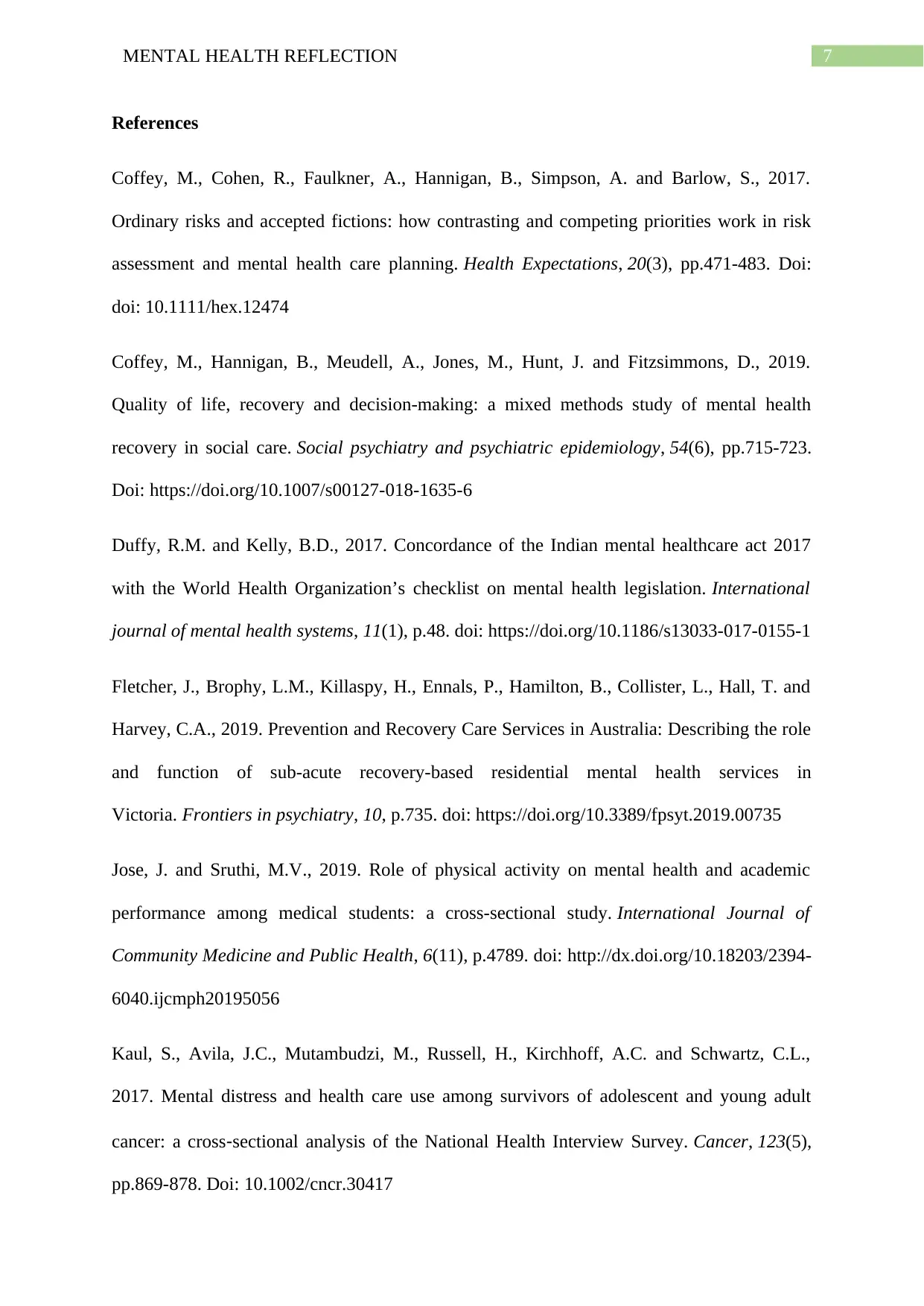
7MENTAL HEALTH REFLECTION
References
Coffey, M., Cohen, R., Faulkner, A., Hannigan, B., Simpson, A. and Barlow, S., 2017.
Ordinary risks and accepted fictions: how contrasting and competing priorities work in risk
assessment and mental health care planning. Health Expectations, 20(3), pp.471-483. Doi:
doi: 10.1111/hex.12474
Coffey, M., Hannigan, B., Meudell, A., Jones, M., Hunt, J. and Fitzsimmons, D., 2019.
Quality of life, recovery and decision-making: a mixed methods study of mental health
recovery in social care. Social psychiatry and psychiatric epidemiology, 54(6), pp.715-723.
Doi: https://doi.org/10.1007/s00127-018-1635-6
Duffy, R.M. and Kelly, B.D., 2017. Concordance of the Indian mental healthcare act 2017
with the World Health Organization’s checklist on mental health legislation. International
journal of mental health systems, 11(1), p.48. doi: https://doi.org/10.1186/s13033-017-0155-1
Fletcher, J., Brophy, L.M., Killaspy, H., Ennals, P., Hamilton, B., Collister, L., Hall, T. and
Harvey, C.A., 2019. Prevention and Recovery Care Services in Australia: Describing the role
and function of sub-acute recovery-based residential mental health services in
Victoria. Frontiers in psychiatry, 10, p.735. doi: https://doi.org/10.3389/fpsyt.2019.00735
Jose, J. and Sruthi, M.V., 2019. Role of physical activity on mental health and academic
performance among medical students: a cross-sectional study. International Journal of
Community Medicine and Public Health, 6(11), p.4789. doi: http://dx.doi.org/10.18203/2394-
6040.ijcmph20195056
Kaul, S., Avila, J.C., Mutambudzi, M., Russell, H., Kirchhoff, A.C. and Schwartz, C.L.,
2017. Mental distress and health care use among survivors of adolescent and young adult
cancer: a cross‐sectional analysis of the National Health Interview Survey. Cancer, 123(5),
pp.869-878. Doi: 10.1002/cncr.30417
References
Coffey, M., Cohen, R., Faulkner, A., Hannigan, B., Simpson, A. and Barlow, S., 2017.
Ordinary risks and accepted fictions: how contrasting and competing priorities work in risk
assessment and mental health care planning. Health Expectations, 20(3), pp.471-483. Doi:
doi: 10.1111/hex.12474
Coffey, M., Hannigan, B., Meudell, A., Jones, M., Hunt, J. and Fitzsimmons, D., 2019.
Quality of life, recovery and decision-making: a mixed methods study of mental health
recovery in social care. Social psychiatry and psychiatric epidemiology, 54(6), pp.715-723.
Doi: https://doi.org/10.1007/s00127-018-1635-6
Duffy, R.M. and Kelly, B.D., 2017. Concordance of the Indian mental healthcare act 2017
with the World Health Organization’s checklist on mental health legislation. International
journal of mental health systems, 11(1), p.48. doi: https://doi.org/10.1186/s13033-017-0155-1
Fletcher, J., Brophy, L.M., Killaspy, H., Ennals, P., Hamilton, B., Collister, L., Hall, T. and
Harvey, C.A., 2019. Prevention and Recovery Care Services in Australia: Describing the role
and function of sub-acute recovery-based residential mental health services in
Victoria. Frontiers in psychiatry, 10, p.735. doi: https://doi.org/10.3389/fpsyt.2019.00735
Jose, J. and Sruthi, M.V., 2019. Role of physical activity on mental health and academic
performance among medical students: a cross-sectional study. International Journal of
Community Medicine and Public Health, 6(11), p.4789. doi: http://dx.doi.org/10.18203/2394-
6040.ijcmph20195056
Kaul, S., Avila, J.C., Mutambudzi, M., Russell, H., Kirchhoff, A.C. and Schwartz, C.L.,
2017. Mental distress and health care use among survivors of adolescent and young adult
cancer: a cross‐sectional analysis of the National Health Interview Survey. Cancer, 123(5),
pp.869-878. Doi: 10.1002/cncr.30417
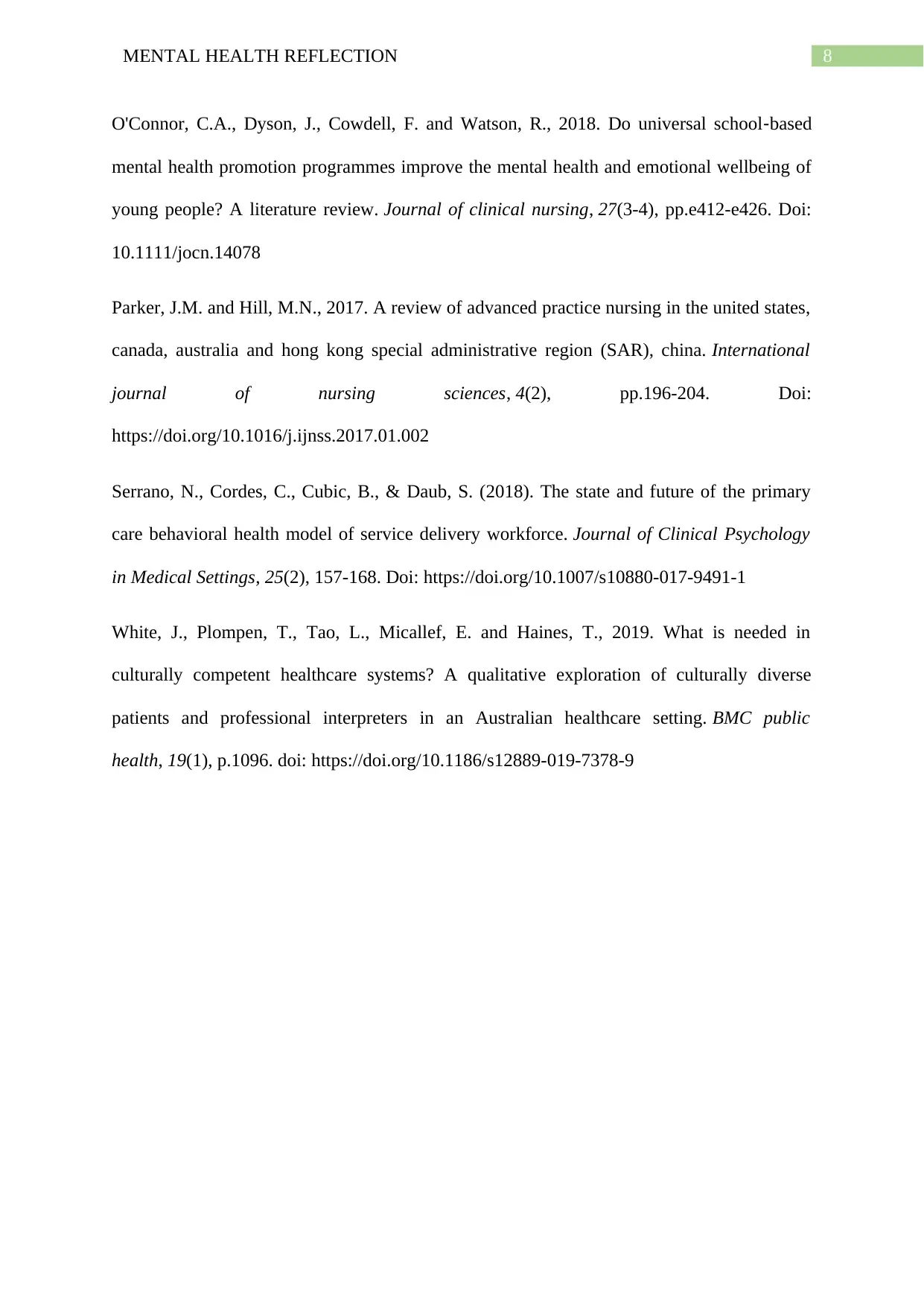
8MENTAL HEALTH REFLECTION
O'Connor, C.A., Dyson, J., Cowdell, F. and Watson, R., 2018. Do universal school‐based
mental health promotion programmes improve the mental health and emotional wellbeing of
young people? A literature review. Journal of clinical nursing, 27(3-4), pp.e412-e426. Doi:
10.1111/jocn.14078
Parker, J.M. and Hill, M.N., 2017. A review of advanced practice nursing in the united states,
canada, australia and hong kong special administrative region (SAR), china. International
journal of nursing sciences, 4(2), pp.196-204. Doi:
https://doi.org/10.1016/j.ijnss.2017.01.002
Serrano, N., Cordes, C., Cubic, B., & Daub, S. (2018). The state and future of the primary
care behavioral health model of service delivery workforce. Journal of Clinical Psychology
in Medical Settings, 25(2), 157-168. Doi: https://doi.org/10.1007/s10880-017-9491-1
White, J., Plompen, T., Tao, L., Micallef, E. and Haines, T., 2019. What is needed in
culturally competent healthcare systems? A qualitative exploration of culturally diverse
patients and professional interpreters in an Australian healthcare setting. BMC public
health, 19(1), p.1096. doi: https://doi.org/10.1186/s12889-019-7378-9
O'Connor, C.A., Dyson, J., Cowdell, F. and Watson, R., 2018. Do universal school‐based
mental health promotion programmes improve the mental health and emotional wellbeing of
young people? A literature review. Journal of clinical nursing, 27(3-4), pp.e412-e426. Doi:
10.1111/jocn.14078
Parker, J.M. and Hill, M.N., 2017. A review of advanced practice nursing in the united states,
canada, australia and hong kong special administrative region (SAR), china. International
journal of nursing sciences, 4(2), pp.196-204. Doi:
https://doi.org/10.1016/j.ijnss.2017.01.002
Serrano, N., Cordes, C., Cubic, B., & Daub, S. (2018). The state and future of the primary
care behavioral health model of service delivery workforce. Journal of Clinical Psychology
in Medical Settings, 25(2), 157-168. Doi: https://doi.org/10.1007/s10880-017-9491-1
White, J., Plompen, T., Tao, L., Micallef, E. and Haines, T., 2019. What is needed in
culturally competent healthcare systems? A qualitative exploration of culturally diverse
patients and professional interpreters in an Australian healthcare setting. BMC public
health, 19(1), p.1096. doi: https://doi.org/10.1186/s12889-019-7378-9
⊘ This is a preview!⊘
Do you want full access?
Subscribe today to unlock all pages.

Trusted by 1+ million students worldwide
1 out of 9
Related Documents
Your All-in-One AI-Powered Toolkit for Academic Success.
+13062052269
info@desklib.com
Available 24*7 on WhatsApp / Email
![[object Object]](/_next/static/media/star-bottom.7253800d.svg)
Unlock your academic potential
Copyright © 2020–2026 A2Z Services. All Rights Reserved. Developed and managed by ZUCOL.





